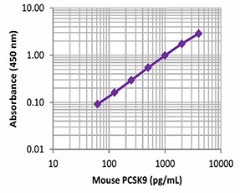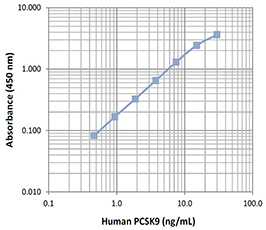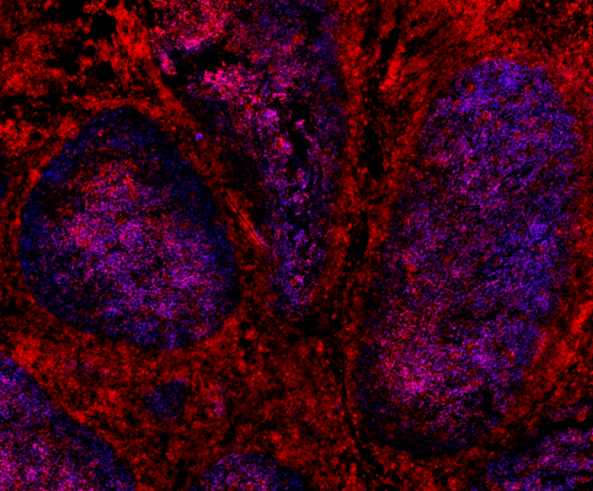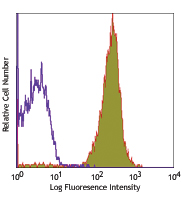- Regulatory Status
- RUO
- Other Names
- HCHOLA3, NARC1
- Ave. Rating
- Submit a Review
- Product Citations
- publications

Protein Convertase Subtilisin/Kexin Type 9 (PCSK9) belongs to the proteinase K subfamily of subtilases and is expressed as a soluble zymogen that undergoes autocatalytic intramolecular processing in the endoplasmic reticulum. Mouse PCSK9 is a 694 amino acid glycoprotein and shares 78% and 92% amino acid identity with human and rat PCSK9, respectively.
PCSK9 is mainly expressed in liver, and at lower levels in kidney, intestine, and brain. It regulates plasma cholesterol homeostasis via binding to low-density lipid receptor family members such as Low-density lipoprotein receptor (LDLR). The binding of PCSK9 to LDLR enhances the degradation of the LDLR in endosomes/lysosomes, resulting in increased circulating LDL-Cholesterol (LDL-C). Elevated LDL-C levels are a major risk factor for cardiovascular disease and atherosclerosis. Individuals with genetic loss-of-function mutations in PCSK9 have reduced plasma levels of LDL-C and are protected from coronary heart disease. Thus, PCSK9 has gained attention as a pharmacological target for cardiovascular diseases and atherosclerosis.
BioLegend's LEGEND MAX™ Mouse PCSK9 ELISA Kit is a Sandwich Enzyme-Linked Immunosorbent Assay (ELISA) with a 96-well strip plate that is pre-coated with a rat anti-mouse PCSK9 monoclonal antibody. The Detection Antibody is a Biotinylated goat anti-mouse PCSK9 polyclonal antibody. This kit is specifically designed for the accurate quantitation of mouse PCSK9 from serum, plasma, cell culture supernatant, cell lysate, tissue homogenate, and other biological fluids. It is analytically validated wtih ready-to-use reagents.
Kit Contents
- Kit Contents
-
- Anti-Mouse PCSK9 Pre-coated 96 well Strip Microplate
- Mouse PCSK9 Detection Antibody
- Mouse PCSK9 Standard
- Avidin-HRP
- Assay Buffer A
- Wash Buffer (20X)
- Substrate Solution D
- Stop Solution
- Plate Sealers
Product Details
- Verified Reactivity
- Mouse
- Application
-
ELISA
- Product Citations
-
- Sensitivity
- 8.2 pg/mL
- Standard Range
- 62.5 - 4,000 pg/mL
- Materials Not Included
-
- Microplate reader able to measure absorbance at 450 nm
- Adjustable pipettes to measure volumes ranging from 1 to 1,000
- Deionized water
- Wash bottle or automated microplate washer
- Log-Log graph paper or software for data analysis
- Tubes to prepare standard dilutions
- Timer
- Plate Shaker
- Polypropylene vials
Antigen Details
- Biology Area
- Cell Biology, Neuroinflammation, Neuroscience, Signal Transduction
- Molecular Family
- Enzymes and Regulators
- Gene ID
- 100102 View all products for this Gene ID
- UniProt
- View information about PCSK9 on UniProt.org
Related Pages & Pathways
Pages
Related FAQs
- In your LEGEND MAX™ ELISA Kits, there is a step that calls for washing the plates before adding sample. What is the purpose of this step?
-
We typically use a stabilizer for pre-coated plates. The additional washing step is designed to remove these components before you start the assay. If you do not perform the washing, the effect on assay performance is negligible.
- I have multiple LEGEND MAX™ ELISA kits that I want to run simultaneously. Can I use the same wash buffer for all the kits?
-
The wash buffer provided in all our LEGEND MAX™ kits is the same and the part numbers on the wash buffer bottles in these kits should be identical. For ELISA MAX™ Deluxe and ELISA MAX™ Standard Sets, we provide a recipe for the wash buffer on each kit’s technical data sheet. This recipe is the same for all ELISA MAX™ sets.
- For some of your ELISA kits, why do my serum samples require dilution with assay buffer?
-
In some cases, dilution with assay buffer is required to minimize the matrix difference between the samples and the standards to achieve better accuracy.













Follow Us